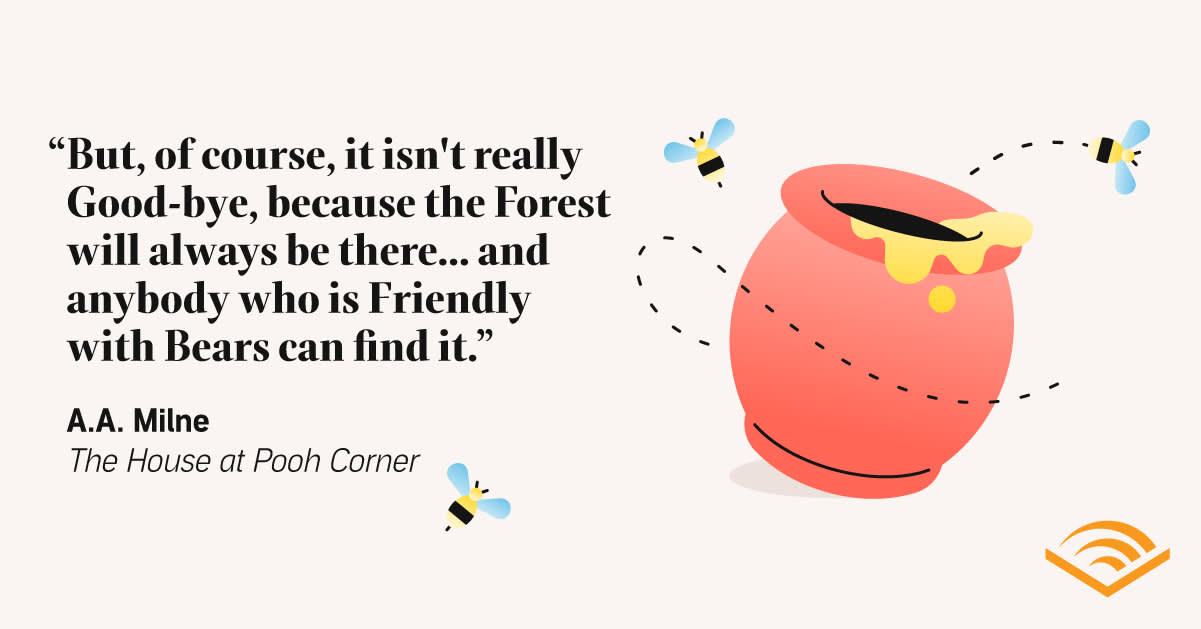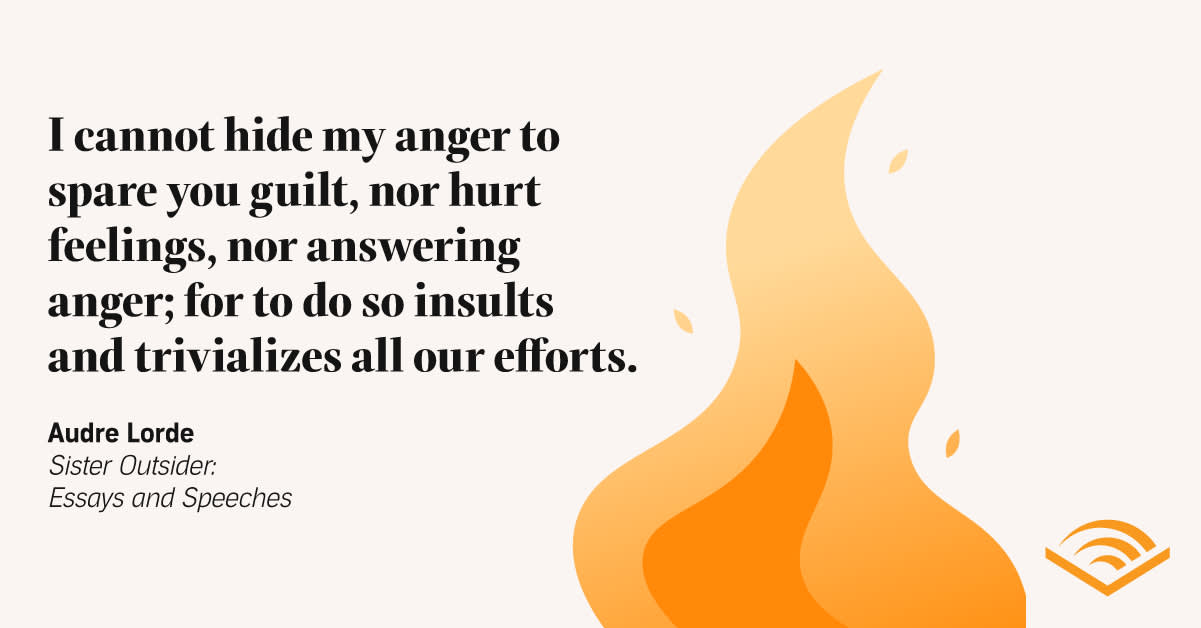Before taking office as the 26th President of the United States of America, Theodore Roosevelt had already made a name for himself as a historian and an adventurer. He became an archetype of the ultra—masculine frontiersman, while still maintaining his image as an intellectual and a scholar. It is perhaps this particular mélange that made him appeal to the American people who would eventually elect him.
Theodore Roosevelt quotes about the outdoors
Aside from being President, Roosevelt was best known as an outdoorsman. He was an ardent lover of nature and had a passion for hunting. His respect for all living things, as well as his high regard for outdoor sportsmen, is evident throughout his writing.
“The forest and water problems are perhaps the most vital internal problems of the United States.” —Theodore Roosevelt: An Autobiography
“My time was still much occupied with looking after the health of my brigade, but the fact that we were going home, where I knew that their health would improve, lightened my mind, and I was able thoroughly to enjoy the beauty of the country, and even of the storms, which hitherto I had regarded purely as enemies.” —The Rough Riders
“Learn to draw quick and shoot straight—the former being even more important than the latter.” —Ranch Life and the Hunting Trail
“Some of these men are brave only because of their confidence in their own skill and strength; once convince them that they are overmatched and they turn into abject cowards.” —Ranch Life and the Hunting Trail
“From its very nature, the life of the hunter is in most places evanescent; and when it has vanished there can be no real substitute in old settled countries.” —The Wilderness Hunter
“No one, but he who has partaken thereof, can understand the keen delight of hunting in lonely lands. For him is the joy of the horse well ridden and the rifle well held; for him the long days of toil and hardship, resolutely endured, and crowned at the end with triumph.” —The Wilderness Hunter
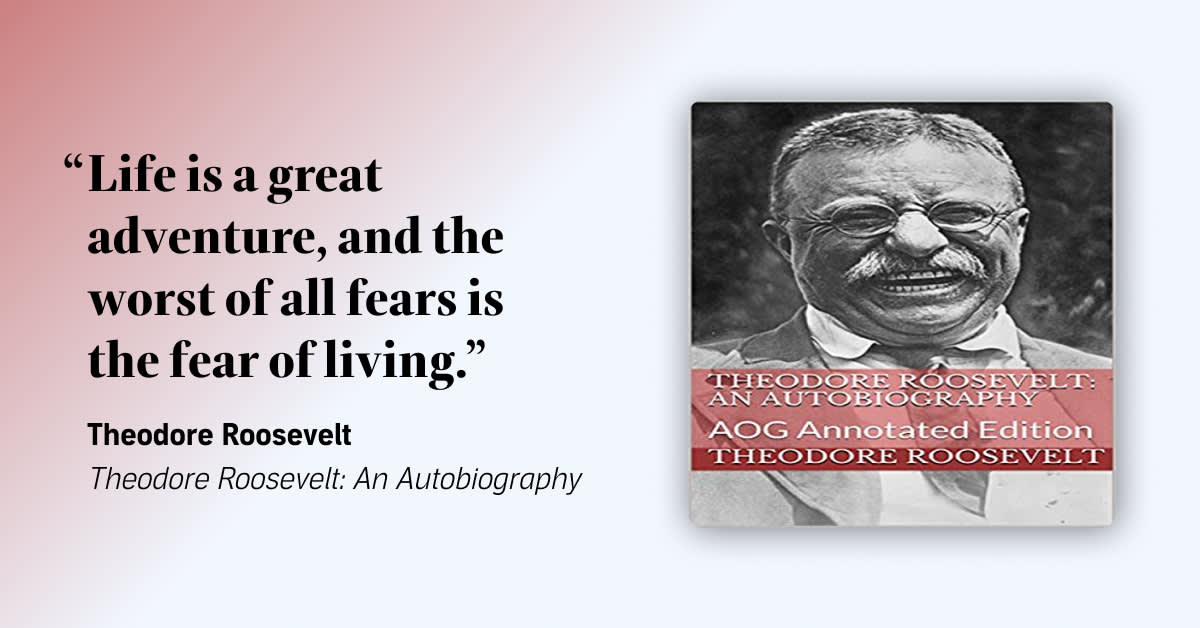
“Ahead of us the sun was sinking behind a mass of blood—red clouds; and on either hand the flushed skies were changing their tint to a hundred hues of opal and amethyst. Our tireless little horses sprang under us, thrilling with life; we were riding through a fairy world of beauty and color and limitless space and freedom.” —The Wilderness Hunter
“The very pathetic myth of ‘beneficent nature’ could not deceive even the least wise being if he once saw for himself the iron cruelty of life in the tropics. Of course ‘nature’—in common parlance a wholly inaccurate term, by the way, especially when used as if to express a single entity—is entirely ruthless, no less so as regards types than as regards individuals, and entirely indifferent to good or evil, and works out her ends or no ends with utter disregard of pain and woe.” —Through the Brazilian Wilderness
“There is certainly the most extraordinary diversity in the traits by which nature achieves the perpetuation of species.” —Through the Brazilian Wilderness
“Every first—rate museum must still employ competent collectors; but I think that a museum could now confer most lasting benefit, and could do work of most permanent good, by sending out into the immense wildernesses, where wild nature is at her best, trained observers with the gift of recording what they have observed.” —Through the Brazilian Wilderness
“The conquest of wild nature demands the utmost vigor, hardihood, and daring, and takes from the conquerors a heavy toll of life and health.” —Through the Brazilian Wilderness
“One of the innumerable mysteries of nature which are at present absolutely insoluble is why some snakes should be so vicious and others absolutely placid and good—tempered.” —Through the Brazilian Wilderness
“The early morning was always lovely on these rivers, and at that hour many birds and beasts were to be seen.” —Through the Brazilian Wilderness
“The man who wishes to do the best scientific work in the wilderness must not try to combine incompatible types of work nor to cover too much ground in too short a time.” —Through the Brazilian Wilderness
"Here is your country. Cherish these natural wonders, cherish the natural resources, cherish the history and romance as a sacred heritage, for your children and your children's children. Do not let selfish men or greedy interests skin your country of its beauty, its riches or its romance." —Theodore Roosevelt: An Autobiography
"The beauty and charm of the wilderness are his for the asking, for the edges of the wilderness lie close beside the beaten roads of the present travel." —Ranch Life and the Hunting Trail
"In hunting, the finding and killing of the game is after all but a part of the whole. The free, self—reliant, adventurous life, with its rugged and stalwart democracy; the wild surroundings, the grand beauty of the scenery...all these unite to give to the career of the wilderness hunter its peculiar charm." —The Wilderness Hunter
"Whoever indulges in any of these methods, save from necessity, is a butcher pure and simple, and has no business in the company of true sportsmen." —The Wilderness Hunter
"The extermination of the buffalo has been a veritable tragedy of the animal world." —The Wilderness Hunter
Theodore Roosevelt quotes about government and civic duty
Roosevelt was also very passionate about civic duty and very transparent with his beliefs on the role of government. Many of these quotes are still applicable today, especially when thinking on America’s global and historical presence.
“For all the laws that the wit of man can devise will never make a man a worthy citizen unless he has within himself the right stuff, unless he has self—reliance, energy, courage, the power of insisting on his own rights and the sympathy that makes him regardful of the rights of others.” —Theodore Roosevelt: An Autobiography
“It is better for the Government to help a poor man to make a living for his family than to help a rich man make more profit for his company.” —Theodore Roosevelt: An Autobiography
“Now and then I am asked as to ‘what books a statesman should read,’ and my answer is, poetry and novels—including short stories under the head of novels. I don't mean that he should read only novels and modern poetry. If he cannot also enjoy the Hebrew prophets and the Greek dramatists, he should be sorry.” —Theodore Roosevelt: An Autobiography
“Just as democratic government cannot be condemned because of errors and even crimes committed by men democratically elected, so trade—unionism must not be condemned because of errors or crimes of occasional trade—union leaders.” —Theodore Roosevelt: An Autobiography
“The position now taken by the Government is absolutely destructive of legitimate business, because they outline no rule of conduct for business of any magnitude.” —Theodore Roosevelt: An Autobiography
“Americans learn only from catastrophe and not from experience.” —Theodore Roosevelt: An Autobiography
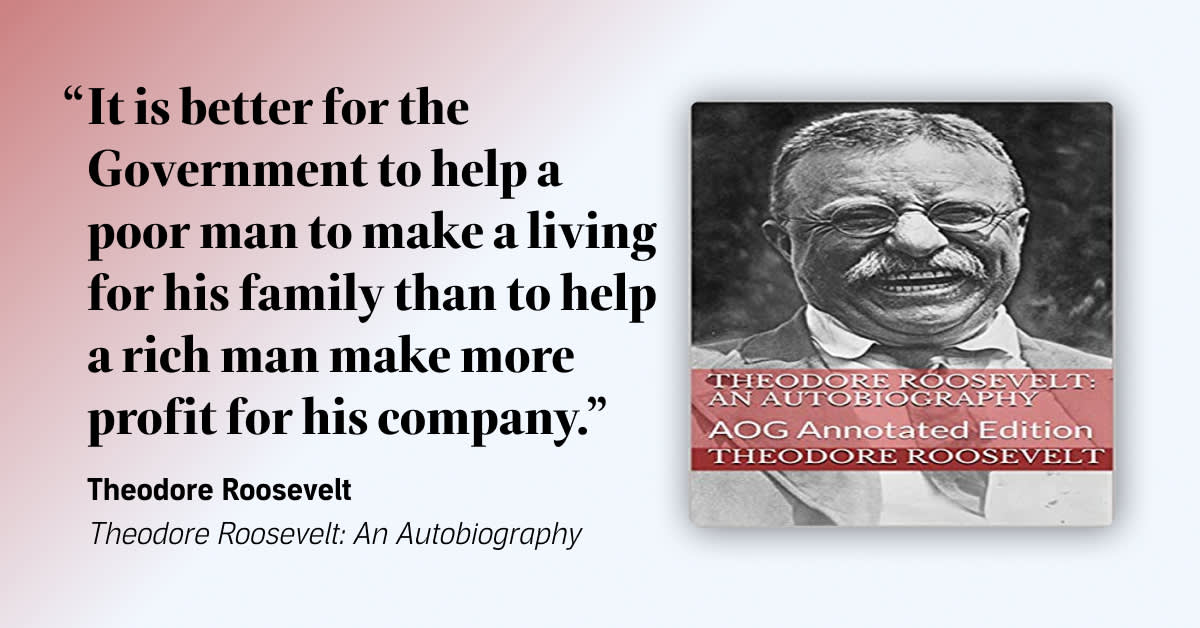
“In no other country in the world had such enormous fortunes been gained. In no other country in the world was such power held by the men who had gained these fortunes; and these men almost always worked through, and by means of, the giant corporations which they controlled. The power of the mighty industrial overlords of the country had increased with giant strides, while the methods of controlling them, or checking abuses by them, on the part of the people, through the Government, remained archaic and therefore practically impotent.” —Theodore Roosevelt: An Autobiography
“We of this generation do not have to face a task such as that our fathers faced, but we have our tasks, and woe to us if we fail to perform them!” —The Strenuous Life
“No man has a right to shirk his political duties under whatever plea of pleasure or business.” —The Duties of American Citizenship
“The first duty of an American citizen, then, is that he shall work in politics; his second duty is that he shall do that work in a practical manner; and his third is that it shall be done in accord with the highest principles of honor and justice.” —The Duties of American Citizenship
“I think we ought to be broad—minded enough to recognize the fact that a good citizen, striving with fearlessness, honesty, and common sense to do his best for the nation, can render service to it in many different ways, and by connection with many different organizations.” —The Duties of American Citizenship
“I do wish that more of our good citizens would go into politics, and would do it in the same spirit with which their fathers went into the Federal armies.” —The Duties of American Citizenship
“There must be absolute religious liberty, for tyranny and intolerance are as abhorrent in matters intellectual and spiritual as in matters political and material; and more and more we must all realize that conduct is of infinitely greater importance than dogma.” —Through the Brazilian Wilderness
“I have always been fond of Josh Billings's remark that ‘it is much easier to be a harmless dove than a wise serpent.’ There are plenty of decent legislators, and plenty of able legislators; but the blamelessness and the fighting edge are not always combined. Both qualities are necessary for the man who is to wage active battle against the powers that prey.” —Theodore Roosevelt: An Autobiography
“A man's first duty is to pull his own weight and to take care of those dependent upon him.” —Theodore Roosevelt: An Autobiography
“We must hold to a rigid accountability those public servants who show unfaithfulness to the interests of the nation or inability to rise to the high level of the new demands upon our strength and our resources.” —The Strenuous Life
“Credit should go with the performance of duty, and not with what is very often the accident of glory.” —The Rough Riders
“They understood that I paid no heed to where they came from; no heed to their creed, politics, or social standing; that I would care for them to the utmost of my power, but that I demanded the highest performance of duty; while in return I had seen them tested, and knew I could depend absolutely on their courage, hardihood, obedience, and individual initiative.” —The Rough Riders
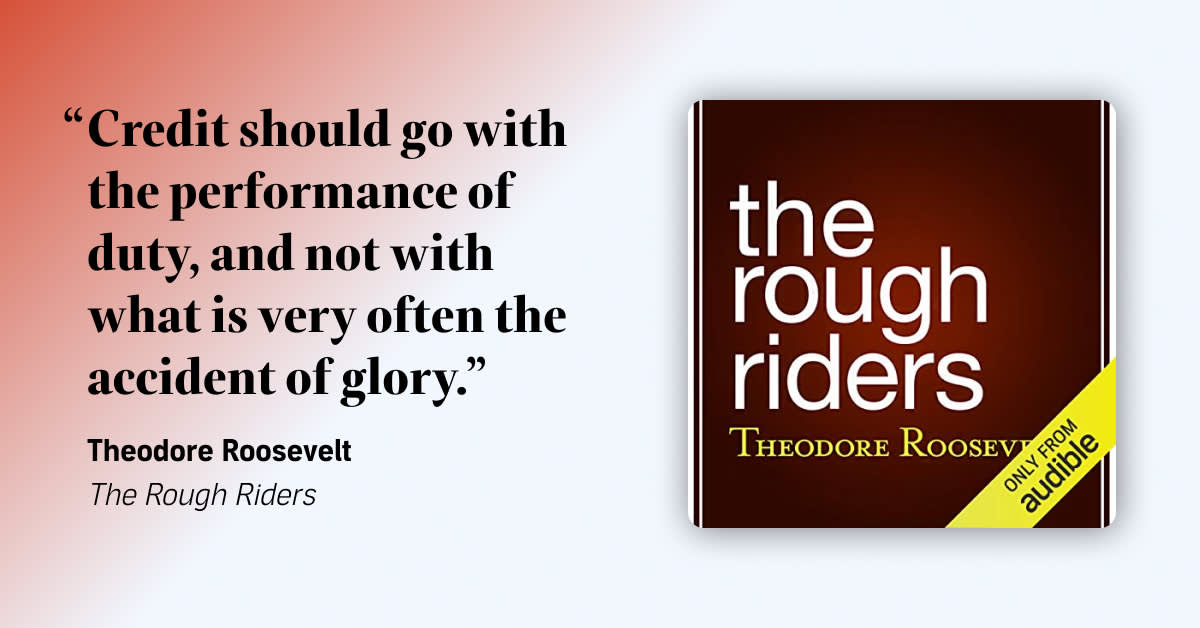
“Thrice happy is the nation that has a glorious history.” —The Strenuous Life
"I stand for having those rules changed so as to work for a more substantial equality of opportunity and of reward for equally good service." —Theodore Roosevelt: An Autobiography
"In any moment of decision, the best thing you can do is the right thing. The worst thing you can do is nothing." —Theodore Roosevelt: An Autobiography
"A good Navy is not a provocation to war. It is the surest guaranty of peace." —The Naval War of 1812
"Just as democratic government cannot be condemned because of errors and even crimes committed by men democratically elected, so trade—unionism must not be condemned because of errors or crimes of occasional trade—union leaders." —Theodore Roosevelt: An Autobiography
"The government is us; we are the government, you and I." —Theodore Roosevelt: An Autobiography
"We of the great modern democracies must strive unceasingly to make our several countries lands in which a poor man who works hard can live comfortably and honestly, and in which a rich man cannot live dishonestly nor in slothful avoidance of duty." —Theodore Roosevelt: An Autobiography
Theodore Roosevelt quotes about life
Theodore Roosevelt was a prolific writer, producing 18 ambitious books and many more essays and speeches. It is not surprising, then, that we find many quotes about life that showcase his opinions concerning important strengths and qualities.
“The worst of all fears is the fear of living. ” Theodore Roosevelt: An Autobiography
“Do not hit at all if it can be avoided; but never hit softly.” —Theodore Roosevelt: An Autobiography
“A man must think well before he marries. He must be a tender and considerate husband and realize that there is no other human being to whom he owes so much of love and regard and consideration as he does to the woman who with pain bears and with labor rears the children that are his.” —Theodore Roosevelt: An Autobiography
“The insistence upon individual responsibility was, and is, and always will be, a prime necessity.” —Theodore Roosevelt: An Autobiography
“[A] man does in very fact become fearless by sheer dint of practicing fearlessness when he does not feel it.” —Theodore Roosevelt: An Autobiography
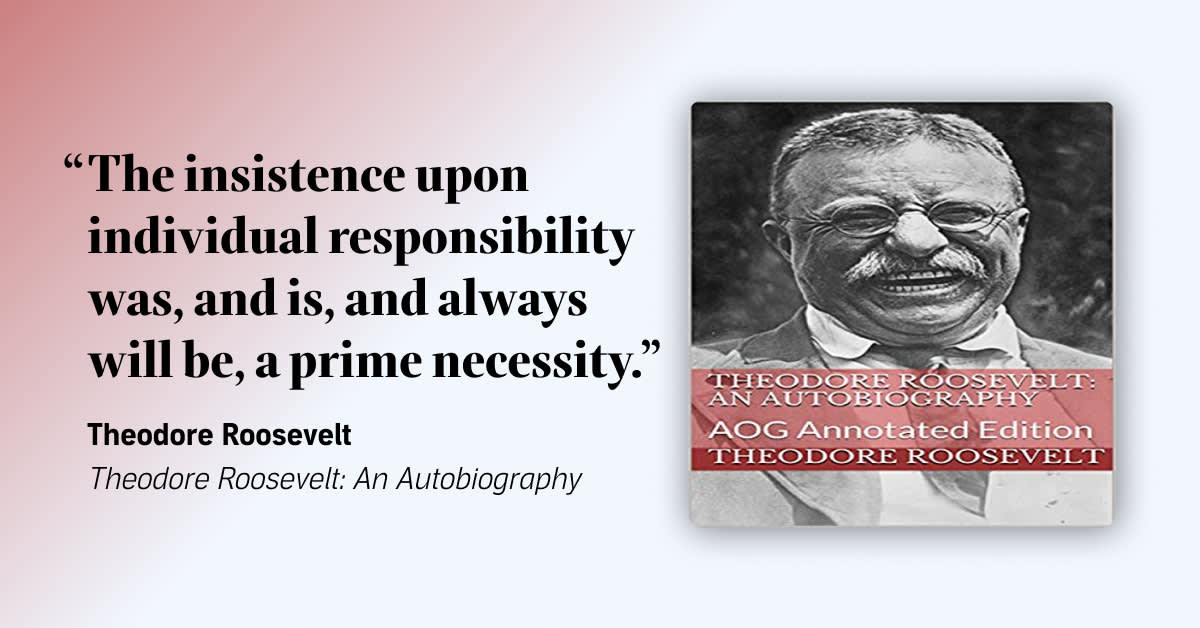
“There were all kinds of things of which I was afraid at first, ranging from grizzly bears to ‘mean’ horses and gun—fighters; but by acting as if I was not afraid I gradually ceased to be afraid.” —Theodore Roosevelt: An Autobiography
“Love of peace is common among weak, short—sighted, timid, and lazy persons; and on the other hand courage is found among many men of evil temper and bad character. Neither quality shall by itself avail.” —Theodore Roosevelt: An Autobiography
“With soul of flame and temper of steel we must act as our coolest judgment bids us.” —Theodore Roosevelt: An Autobiography
“Any man who has met with success, if he will be frank with himself, must admit that there has been a big element of fortune in the success.” —Theodore Roosevelt: An Autobiography
“I had always felt that if there were a serious war I wished to be in a position to explain to my children why I did take part in it, and not why I did not take part in it.” —Theodore Roosevelt: An Autobiography
“Let these innocent people be careful not to invest in corporations where those in control are not men of probity, men who respect the laws; above all let them avoid the men who make it their one effort to evade or defy the laws.” —Theodore Roosevelt: An Autobiography
“If I was not going to earn money, I must even things up by not spending it.” —Theodore Roosevelt: An Autobiography
“Each man should have all he earns... but no man should live on the earnings of another, and there should not be too gross inequality between service and reward.” —Theodore Roosevelt: An Autobiography
“We knew toil and hardship and hunger and thirst; and we saw men die violent deaths as they worked among the horses and cattle, or fought in evil feuds with one another; but we felt the beat of hardy life in our veins, and ours was the glory of work and the joy of living.” —Theodore Roosevelt: An Autobiography
“But the joy of life is a very good thing, and while work is the essential in it, play also has its place.” —Theodore Roosevelt: An Autobiography
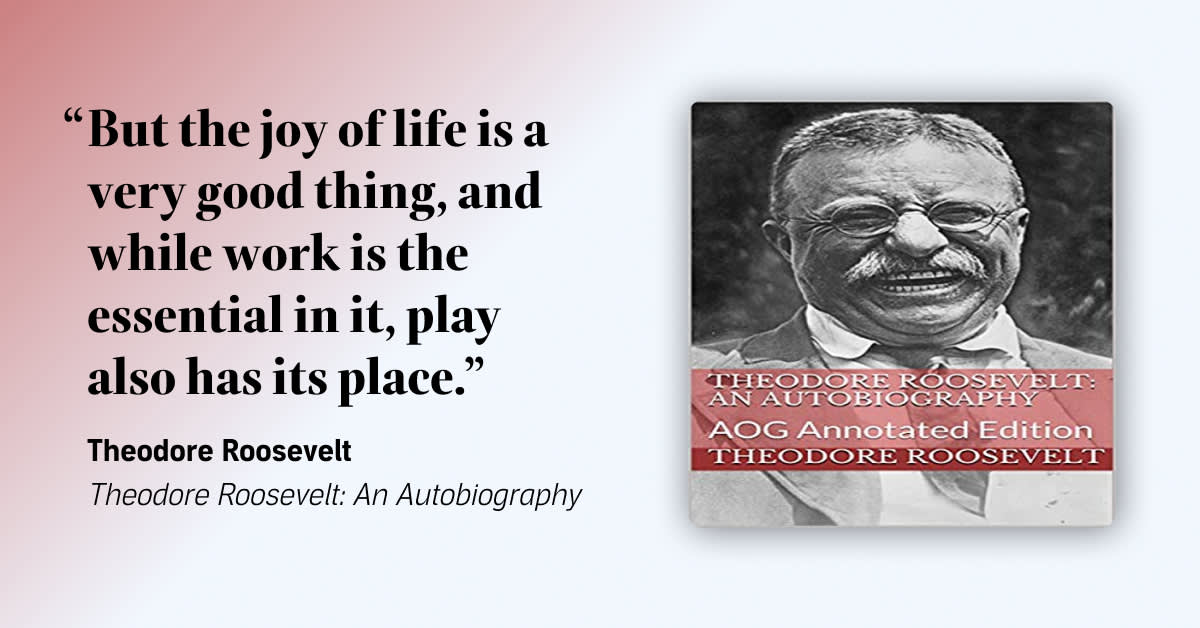
“Books are all very well in their way... but children are better than books.” —Theodore Roosevelt: An Autobiography
“Laissez—faire, says the professor, when it often means bind and gag that the strongest may work his will. It is a plea for the survival of the fittest—for the strongest male to take possession of the herd by a process of extermination.” —Theodore Roosevelt: An Autobiography
“The liberty of the individual has been annihilated by the logical process constructed to maintain it.” —Theodore Roosevelt: An Autobiography
“The room for choice is so limitless that to my mind it seems absurd to try to make catalogues which shall be supposed to appeal to all the best thinkers. This is why I have no sympathy whatever with writing lists of the One Hundred Best Books, or the Five—Foot Library.” —Theodore Roosevelt: An Autobiography
“Far better it is to dare mighty things, to win glorious triumphs, even though checkered by failure, than to take rank with those poor spirits who neither enjoy much nor suffer much, because they live in the gray twilight that knows neither victory nor defeat.” —The Strenuous Life
“I wish to preach, not the doctrine of ignoble ease, but the doctrine of the strenuous life, the life of toil and effort, of labor and strife; to preach that highest form of success which comes, not to the man who desires mere easy peace, but to the man who does not shrink from danger, from hardship, or from bitter toil, and who out of these wins the splendid ultimate triumph.” —The Strenuous Life
“We do not admire the man of timid peace. We admire the man who embodies victorious effort; the man who never wrongs his neighbor, who is prompt to help a friend, but who has those virile qualities necessary to win in the stern strife of actual life.” —The Strenuous Life
“A mere life of ease is not in the end a very satisfactory life, and, above all, it is a life which ultimately unfits those who follow it for serious work in the world.” —The Strenuous Life
“We knew not whither we were bound, nor what we were to do; but we believed that the nearing future held for us many chances of death and hardship, of honor and renown.” —The Rough Riders
“Most of the men had simple souls. They could relate facts, but they said very little about what they dimly felt.” —The Rough Riders
“The only danger lies in the extreme monotony of sitting still in the dark guarding men who make no motion, and the consequent tendency to go to sleep, especially when one has had a hard day's work and is feeling really tired.” —Ranch Life and the Hunting Trail
“A man cannot practice too much with this if he wishes to attain even moderate proficiency; and as a matter of fact he soon gets to wish to practice the whole time.” —Ranch Life and the Hunting Trail
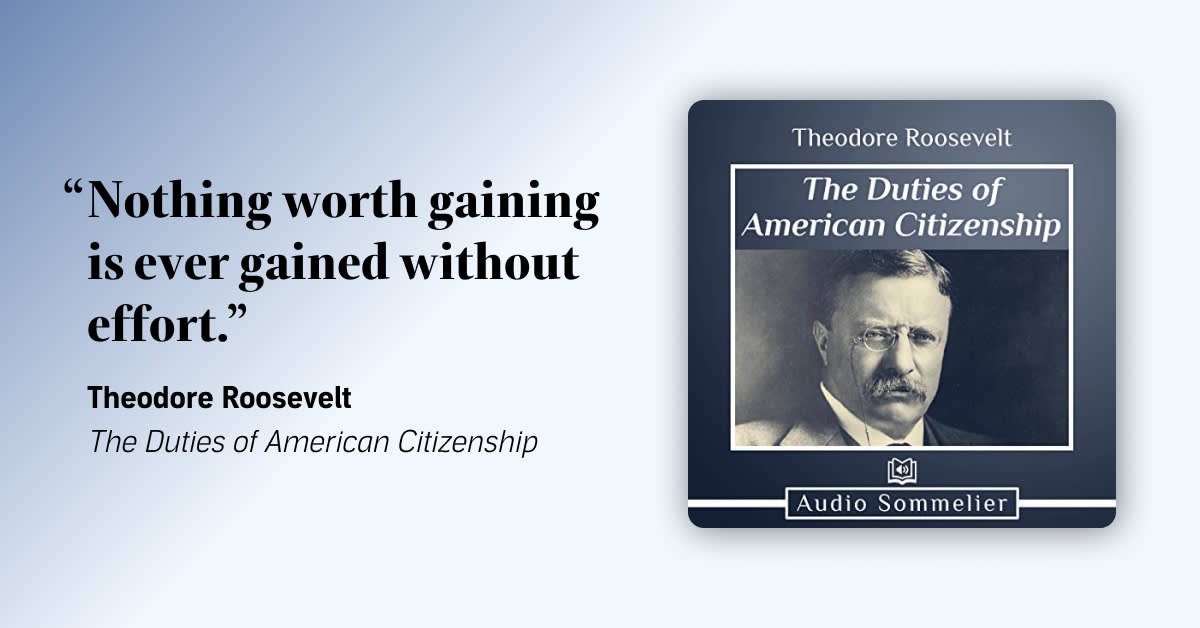
“Nothing worth gaining is ever gained without effort.” —The Duties of American Citizenship
“A race must be strong and vigorous; it must be a race of good fighters and good breeders, else its wisdom will come to naught and its virtue be ineffective; and no sweetness and delicacy, no love for and appreciation of beauty in art or literature, no capacity for building up material prosperity can possibly atone for the lack of the great virile virtues.” —The Duties of American Citizenship
“A great many of our men in business, or of our young men who are bent on enjoying life (as they have a perfect right to do if only they do not sacrifice other things to enjoyment), rather plume themselves upon being good citizens if they even vote; yet voting is the very least of their duties.” —The Duties of American Citizenship
“Training in the writing of good English is indispensable to any learned man who expects to make his learning count for what it ought to count in the effect on his fellow men.” —Through the Brazilian Wilderness
"I do not believe there ever was any life more attractive to a vigorous young fellow than life on a cattle ranch in those days." —Ranch Life and the Hunting Trail
"But for unflagging interest and enjoyment, a household of children, if things go reasonably well, certainly makes all other forms of success and achievement lose their importance by comparison." —Theodore Roosevelt: An Autobiography
"We were travelling through a region where practically all the older men had served in the Confederate Army... and everywhere we were told... that they had never dreamed in the bygone days of bitterness to greet the old flag as they now were greeting it, and to send their sons, as now they were sending them, to fight and die under it." —The Rough Riders
"I was not going to earn money, I must even things up by not spending it." —Theodore Roosevelt: An Autobiography
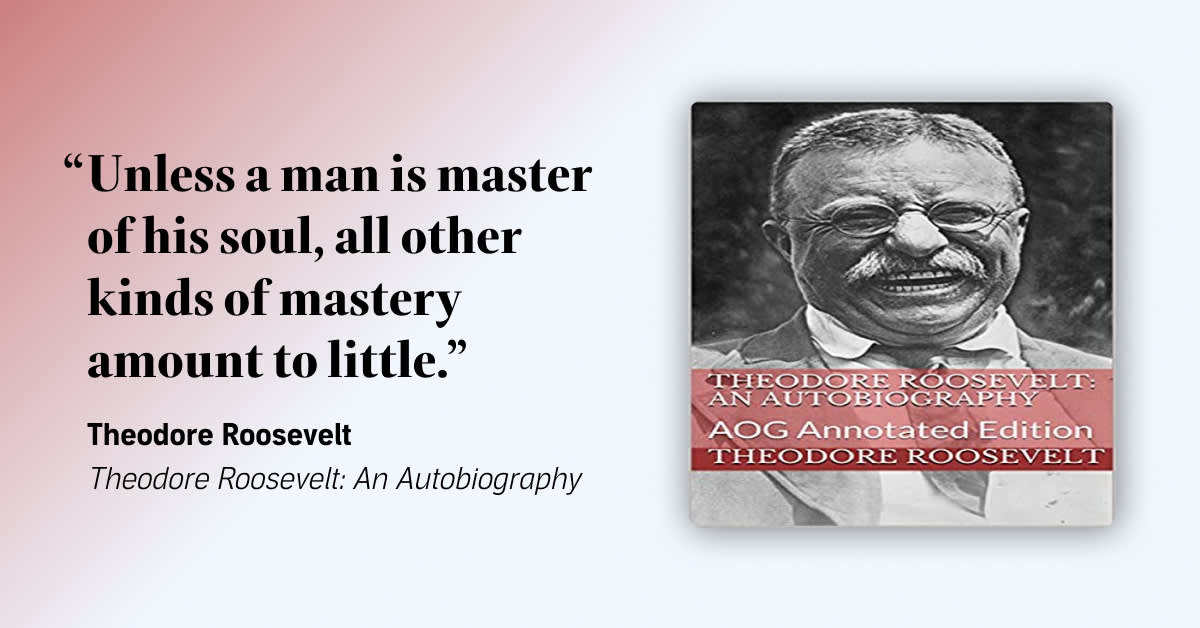
"I grew into manhood thoroughly imbued with the feeling that a man must be respected for what he made of himself." —Theodore Roosevelt: An Autobiography
"With gentleness and tenderness there must go dauntless bravery and grim acceptance of labor and hardship and peril." —Theodore Roosevelt: An Autobiography
"I did not then believe, and I do not now believe, that any man should ever attempt to make politics his only career." —Theodore Roosevelt: An Autobiography
Theodore Roosevelt quotes on the joy of living
Theodore Roosevelt experienced life with an unparalleled zest. His writings reveal a deep appreciation for the joy of living, emphasizing that a life fully embraced involves effort, passion, and a willingness to engage with both its triumphs and its struggles. These quotes underscore his belief that true fulfillment comes not from ease, but from striving, experiencing, and actively participating in the grand adventure of life.
"Far better it is to dare mighty things, to win glorious triumphs, even though checkered by failure, than to take rank with those poor spirits who neither enjoy much nor suffer much, because they live in the gray twilight that knows neither victory nor defeat." —The Strenuous Life
"Nothing in the world is worth having or worth doing unless it means effort, pain, difficulty." —Theodore Roosevelt: An Autobiography
"I wish to preach, not the doctrine of ignoble ease, but the doctrine of the strenuous life, the life of toil and effort, of labor and strife; to preach that highest form of success which comes, not to the man who desires mere easy peace, but to the man who does not shrink from danger, from hardship, or from bitter toil." —The Strenuous Life
"Life is a great adventure, and the worst of all fears is the fear of living." —Theodore Roosevelt, Theodore Roosevelt: An Autobiography
"I have never in my life envied a human being who led an easy life. I have envied a great many people who led difficult lives and led them well." —Theodore Roosevelt: An Autobiography
"We knew toil and hardship and hunger and thirst... but we felt the beat of hardy life in our veins, and ours was the glory of work and the joy of living." —Theodore Roosevelt: An Autobiography
"There has never yet been a person in our history who led a life of ease whose name is worth remembering." —Theodore Roosevelt: An Autobiography
"A soft, easy life is not worth living, if it impairs the fibre of brain and heart and muscle. We must dare to be great; and we must realize that greatness is the fruit of toil and sacrifice and high courage." —The Strenuous Life
"Far and away the best prize that life has to offer is the chance to work hard at work worth doing." —Theodore Roosevelt: An Autobiography
Theodore Roosevelt quotes on character and courage
Theodore Roosevelt's life was a testament to his belief that character and courage were paramount. He understood that true strength wasn't just about physical prowess, but about the inner resolve to face challenges with integrity and determination. This collection of quotes highlights his perspective on the importance of moral fiber, the willingness to act, and the understanding that mistakes are often the stepping stones to greater achievements.
"It is not the critic who counts; not the man who points out how the strong man stumbles, or where the doer of deeds could have done them better. The credit belongs to the man who is actually in the arena, whose face is marred by dust and sweat and blood..." —Theodore Roosevelt: An Autobiography
"The only man who never makes a mistake is the man who never does anything." —Theodore Roosevelt: An Autobiography
"by acting as if I was not afraid I gradually ceased to be afraid." —Theodore Roosevelt: An Autobiography
"Bodily vigor is good, and vigor of intellect is even better, but far above both is character." —The Strenuous Life
"The chief factor in any man's success or failure must be his own character." —The Strenuous Life
"Unless a man is master of his soul, all other kinds of mastery amount to little." —Theodore Roosevelt: An Autobiography
"Practical efficiency is common, and lofty idealism not uncommon; it is the combination which is necessary, and the combination is rare." —Theodore Roosevelt: An Autobiography
"Do not hit at all if it can be avoided; but never hit softly." —Theodore Roosevelt: An Autobiography
"Knowing what's right doesn't mean much unless you do what's right." —The Strenuous Life
"A man must be respected for what he made of himself." —Theodore Roosevelt: An Autobiography
"It is hard to fail; but it is worse never to have tried to succeed." —Theodore Roosevelt: An Autobiography


